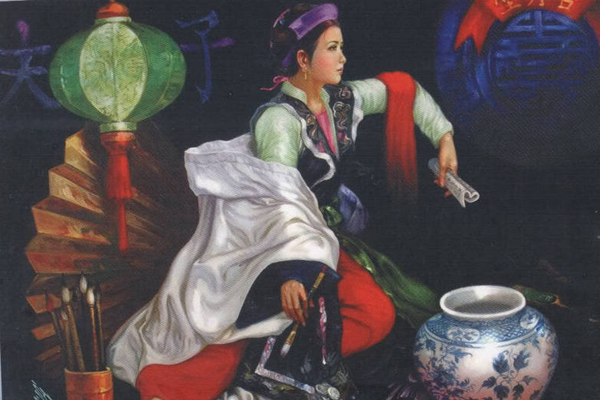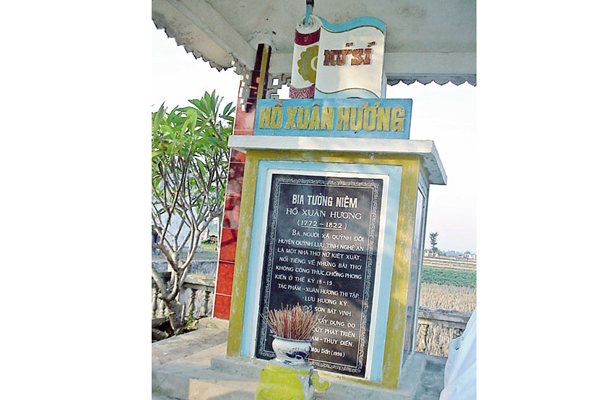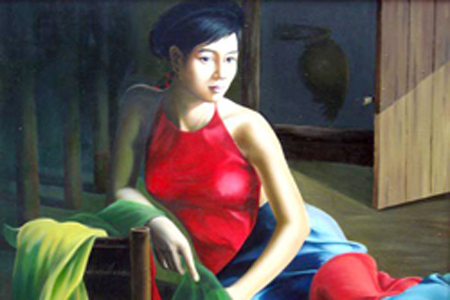It is not easy to try to retrace Ho Xuan Huong's life. Even her very existence has been sometimes called in question. Today documents on her life as well as on her works are still lacking.
According to researcher Tran Thanh Mai, "To this day, we do not yet have at our disposal accurate official documents on the life and works of Ho Xuan Huong, originals in "nom" or copies made in her period, or even at a time nearer to her own. The only poems in "nom" attributed to Ho Xuan Huong that we have date back to 1913 in the publications by Xuan Lan in their Quoc Ngu transcription. The texts in nom reproduced by xylography by Hanoi publishers at Hang Gai Street, Phuc Van Duong, Quang Van Duong, etc... are all later than the Xuan Lan Edition."
"There are also a certain number of Collected works of Xuan Huong written by hand, but their paper and ink seem to be relatively recent. This is probably a compilation of the texts in xylography of the Publishers on Hang Gai Street, (Hemp Street) in Hanoi."

However, the History of Vietnam Literature (Social Sciences Edition, 1980) does mention a collection of poems in nom written by hand and registered in 1912 (Library of Social Sciences).
'The Summary Bibliography of Vietnamese writers" published by the Committee of Social Science gives some details about Ho Xuan Huong's life founded on traditional sources (by Tran Van Giap, Ta Phong Chau, Nguyen Van Phu, Nguyen Tuong Phuong, Do Thien).'
You may also like some more tours provide by us at: Vietnam Tours, Vietnam Luxury Tours
Let us also mention some of the recent research on Ho Xuan Huong. Interesting documents have been found in Nam Ha Province, in particular a text in Classical Chinese, the Xuan Duong Dam thoai written by Tran Bich San (1840-1878) - See Tap Chi Van Hoc (N°3, 1974).
In an article (Tap Chi Van Hoc) written by Dao Thai Ton, the following question was raised. ‘Was Ho Xuan Huong related to Nguyen Hue?' Nguyen Hue was the famous leader of the peasants' insurgent movement who became king under the name of Quang Trung.
Tran Thanh Mai made known a collection of poems in nom of Ho Xuan Huong with a preface by Nham Gioc Phu (Tap Chi Van Hoc). Yet, according to Nguyen Loc (Poems of Ho Xuan Huong, Edition Van Hoc, 1982), this work is not quite trustworthy.
The research on Ho Xuan Huong, Dao Thai Ton notices, continually bring to light new and interesting documents but in this poem, the new documents always contradict older ones. The recent book by Dao Thai Ton 'Tho Ho Xuan Huong, tu coi nguon vao the tuc") laid stress on the importance of Mr Hoang Xuan Han's research and the authenticity of Ho Xuan Huong's Luu Huong Ky.
Ho Xuan Huong is thought to be native of the village of Quynh Doi, Quynh Luu district, Nghe An Province. Related to the famous scholar Ho Phi Tich, she was the daughter of Ho Phi Dien and Madame Ha Thi, who was a native of Hai Duong Province situated between Hanoi and Haiphong (or Bac Ninh Province).

It is thought that her family later settled in the suburbs of Hanoi, at Khan Xuan, one of the villages on the shore of West Lake, where peach trees blossom at the time of the Tet Festival.
These details square with information given by the French researcher, Maurice Durand. He writes, 'Little is known exactly about the life of Ho Xuan Huong's, contemporary of Pham Dinh Ho (1768-1839)."
He confirms that her family was related to the Ho family (Ho Phi) on her father’s side, native of Quynh Luu district (Nghe An). One member of this family of scholars, Ho Phi Tich was awarded the title of Doctor at 25 years of age, in the competitive examinations in the 21st year of the Chinh Hoa era; he is thought to have been the Vietnamese Ambassador to China. The latter’s seventh son, Ho Phi Thuong is thought to have been a civil servant in Thanh Hoa in the XVIIIth Century during the Tay Son Epoch. Ho Xuan Huong's mother is thought to have been Ho Phi Dien's second ranked wife.
As to her nam, Xuan Huong, may have come from the name of her village Khan Xuan (Khan = to comtem- plate + Xuan = Spring), Xuan Huong (Spring + Perfume) means Spring perfume.
According to tradition, Ho Xuan Huong was not favored in her physical appearance.
Maurice Durand chooses to believe this is true, citing as evidence 2 verses of ’The Jack Fruit,’
My body is like the jack-fruit Prickly skin, thick pulp..
We don't think this deduction is very convincing.
In any case, even if Ho Xuan Huong was not beautiful, she was surely not lacking in charm, and the brightness of her spirit allowed her to marry twice, and then, as a widow, to be courted by many famous scholars.



